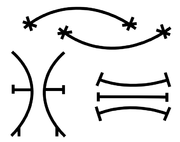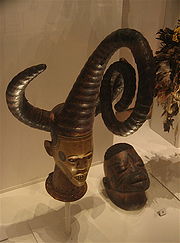
Egbo
Encyclopedia

Secret society
A secret society is a club or organization whose activities and inner functioning are concealed from non-members. The society may or may not attempt to conceal its existence. The term usually excludes covert groups, such as intelligence agencies or guerrilla insurgencies, which hide their...
flourishing chiefly among the Efiks of the Cross River State
Cross River State
Cross River State is a coastal state in southeastern Nigeria, bordering Cameroon to the east. Its capital is at Calabar, and it is named for the Cross River , which passes through the state...
, the Oron, of Akwa Ibom State, Nigeria
Nigeria
Nigeria , officially the Federal Republic of Nigeria, is a federal constitutional republic comprising 36 states and its Federal Capital Territory, Abuja. The country is located in West Africa and shares land borders with the Republic of Benin in the west, Chad and Cameroon in the east, and Niger in...
, Igbos in Abia State
Abia State
Abia State is a state in southeastern Nigeria. The capital is Umuahia, although the major commercial city is Aba, formerly a British colonial government outpost. The state was created in 1991 from part of Imo State and its citizens are predominantly Igbo people...
, as well as Southeastern Nigerians Igbo/Efik/Oron in the diaspora, such as in Cuba
Cuba
The Republic of Cuba is an island nation in the Caribbean. The nation of Cuba consists of the main island of Cuba, the Isla de la Juventud, and several archipelagos. Havana is the largest city in Cuba and the country's capital. Santiago de Cuba is the second largest city...
. The society is still active at the beginning of the 21st century, allegedly only playing a ceremonial role. There are two distinct but related societies, the primary one in the Cross River
Cross River (Nigeria)
Cross River is the main river in southeastern Nigeria and gives its name to Cross River State.It originates in Cameroon, where it takes the name of the Manyu River....
and Akwa Ibom
Akwa Ibom
Akwa Ibom is a state in Nigeria named after the Qua Iboe river. It is located in the coastal South-Southern part of the country, lying between latitudes 4°321 and 5°331 North, and longitudes 7°251 and 8°251 East...
areas, and the secondary one among the Southern and Eastern Igbo groups. Members of the Ekpe invented Nsibidi
Nsibidi
Nsibidi is a system of symbols indigenous to what is now southeastern Nigeria that is apparently ideographic, though there have been suggestions that it includes logographic elements...
, a script. Ekpe is not the same thing as Ekpo, or Ekong, which are other societies in the Cross River basin, especially in Akwa Ibom State, Annang
Annang
The Annang is a cultural and ethnic group that lives in the Coastal Southeast Nigeria...
do not practice Ekpe.
Ekpe (Egbo)

Sanitation
Sanitation is the hygienic means of promoting health through prevention of human contact with the hazards of wastes. Hazards can be either physical, microbiological, biological or chemical agents of disease. Wastes that can cause health problems are human and animal feces, solid wastes, domestic...
.
Amama
Social importance is attached to the highest ranks of Ekpe-men, called Amama. At least in the past, very large sums, sometimes more than a thousand pounds, were paid to attain these upper levels. The trade-off is that the Amama often control the majority of the community wealth. The Amama often appropriate hundreds of acres of palm trees for their own use and, with the profits they earn, ensure that their sons achieve comparable rank, which has the effect of limiting access to economic gain for other members of the community. The Ekpe society requires that its initiates sponsor feasts for the town, which foster the appearance of the redistribution of wealth by providing the poor with food and drink.Art and ceremonies
The Ekpe-house, an oblong building like the nave of a church, usually stands in the middle of the villages. The walls are of clay elaborately painted inside and ornamented with clay figures in relief. Inside are wooden images to which reverence is paid.At Ekpe festivals masked dancers perform. Some of the older masks show horns and filed teeth. Non initiates and women are not allowed to come in contact with the masked dancers.
Abakuá
Abakua or Abakuá (various spellings are used) is an Afro-CubaCuba
The Republic of Cuba is an island nation in the Caribbean. The nation of Cuba consists of the main island of Cuba, the Isla de la Juventud, and several archipelagos. Havana is the largest city in Cuba and the country's capital. Santiago de Cuba is the second largest city...
n men's initiatory fraternity, or secret society, which originated from the Ekpe/Egbo society in the Cross River region of southeastern Nigeria
Nigeria
Nigeria , officially the Federal Republic of Nigeria, is a federal constitutional republic comprising 36 states and its Federal Capital Territory, Abuja. The country is located in West Africa and shares land borders with the Republic of Benin in the west, Chad and Cameroon in the east, and Niger in...
and southwestern Cameroon

